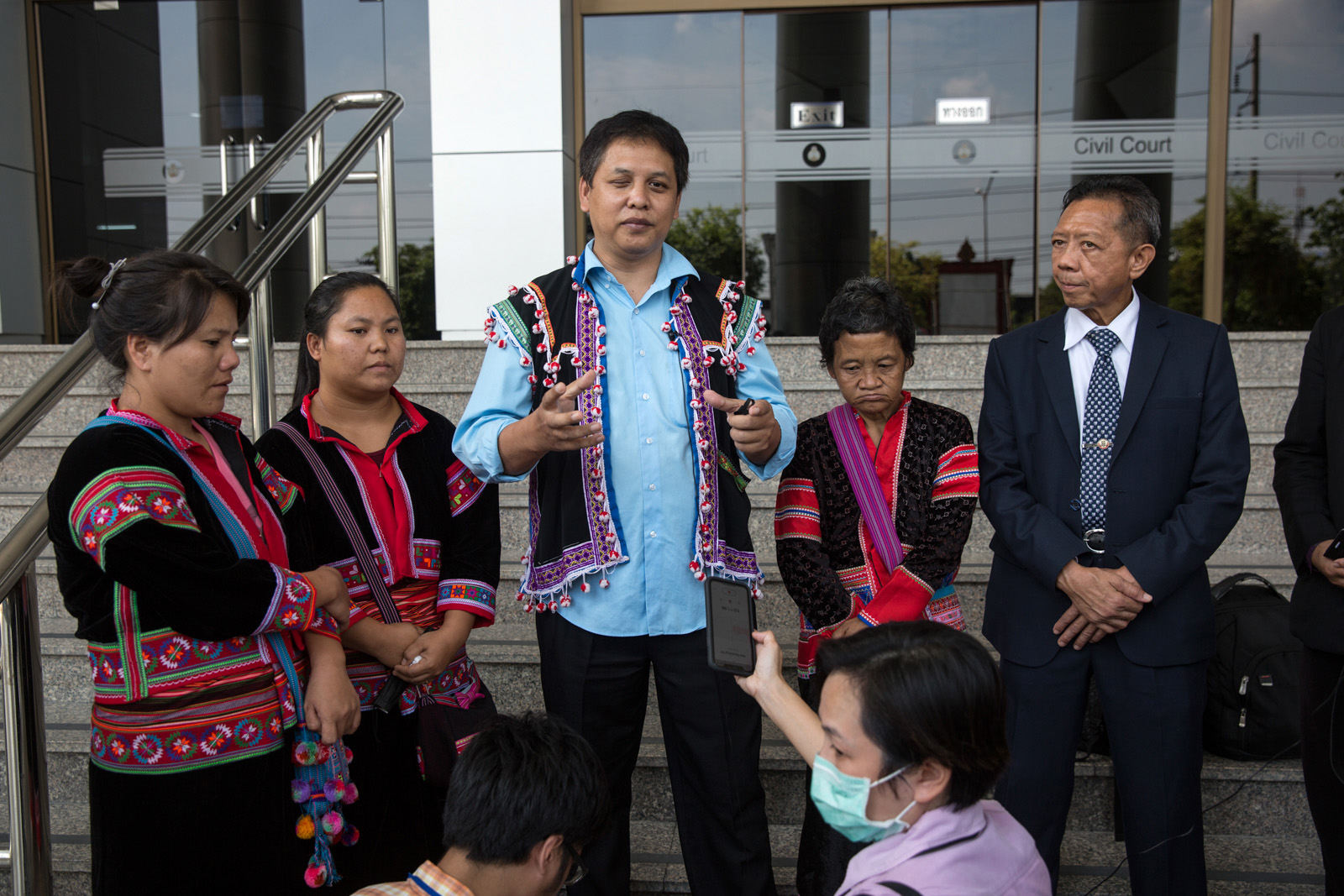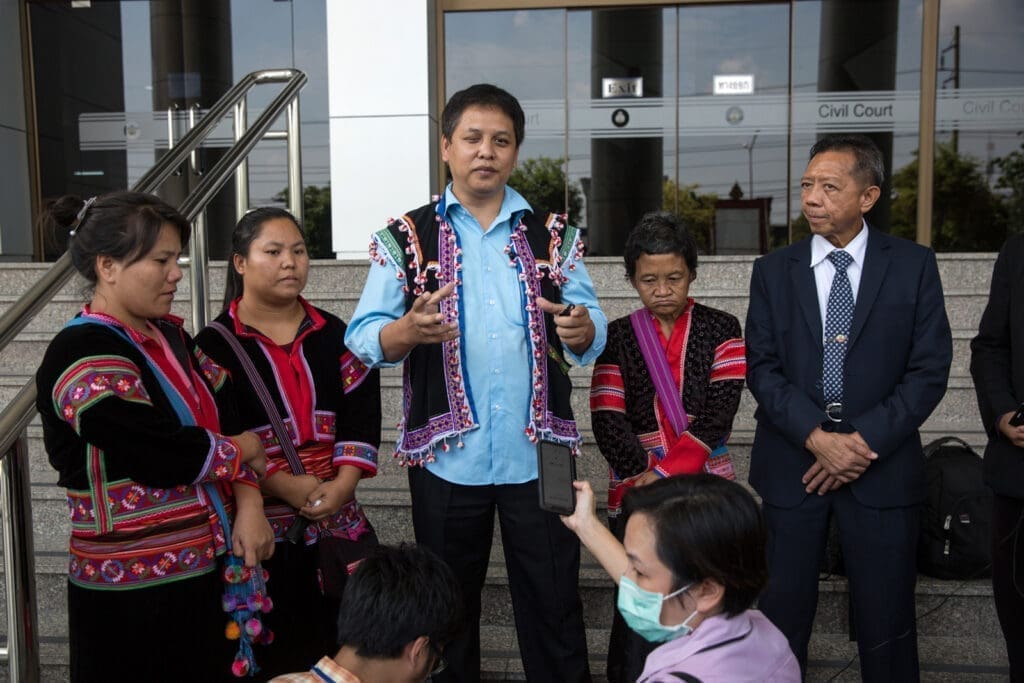The Civil Court dismisses the extrajudicial killing case concerning young indigenous human rights defender Chaiyaphum Pasae. Chaiyaphum’s lawyer noted several irregularities while family members prepared to appeal the decision.
Bangkok, 29 October 2020 – On 26 October 2020, the Civil Court in Bangkok read the verdict in which the family members of Chaiyaphum Pasae, a 17-year-old indigenous human rights defender in Chiang Mai Province, filed a lawsuit to claim damages from the Army. The case is derived from the incident in which two military officers extrajudicially killed Chaiyaphum on 17 March 2017 in Chiang Dao District, Chiang Mai Province.

The military officers claim that they found drugs in Chaiyaphum’s car, which led to their shooting Chaiyaphum to search the vehicle. The officers claim they shot Chaiyaphum in his arm because he resisted the search and attempted to throw a grenade at the military officers.
During the hearing that took place in June 2018, evidence revealed that the military officers used an M16 assault rifle to shoot bullets through Chaiyaphum’s left arm, which in turn entered the left side of his body and hit his aorta, heart, and lungs, causing his death.
The court ruled that the military shot Chaiyaphum in self-defense and it was necessary. Therefore, the court claimed that the Royal Thai Army is not liable to pay damages to Chaiyaphum’s family in conjunction with the Officers’ Violation Liability Act of 1996.
Traveling from Chiang Mai, Napoi Pasae, Chaiyaphum’s mother attended the hearing with Maitree Chamroensuksakul, Chair of Rak Lahu Group, and the legally authorized people assigned to represent Chaiyaphum, Nawa Ja-ue, and Yupin Saja, Chaiyaphum’s caretakers, as well as their lawyers Ratsada Manuratsada and Preeda Nakpew.
Ratsada Manuratsada, the attorney of Chaiyaphum’s family, said that the family members and lawyers disagree with the verdict, citing several irregularities:
Firstly, the court specifically gave extra weight to the testimony of Phongsanai Saengtala, who was driving Chaiyaphum’s car on the day of the incident. Phongsanai did not testify in court but instead gave testimony during the police investigation. However, the lawyer noted that Phongsanai’s testimony was collected about two weeks after the event; as per typical protocol, it should be collected immediately after the incident. Moreover, the lawyer noted that Phongsanai was not charged with possession of drugs even though he was in the same vehicle where the drugs were allegedly found.
“If people are seated together in the same car and that car has a large number of drugs, generally, he would be charged with having the drugs in his possession. But in this case, it was not like that. We have to look at why one person was killed, but the other who was present and sat in the same car was not charged or prosecuted,” said Mr Manuratsada.
In addition, the lawyer also noted that the CCTV recording of the incident remains missing even though it is key evidence that might be able to reveal exactly what happened. Despite this, the court gave weight to the Police’s Office of Forensic Science, which examined the CCTV recording received from the military officer stationed at Ban Rin Luang checkpoint.
The Office of Forensic Science stated in the examination report that there was no suspicion or attempt by the defendant to modify, change, or destroy any information contained in the CCTV recording. The results of verification and expert opinion indicate that the recordings, CCTV cameras, and hard disks installed still functioned as normal.
As for the recording of the actual incident on 17 March 2017 at 10:00 am, there was no deletion or addition of movie files in the recorder, the verdict cites the Office’s report. But the court did not ask where is CCTV footage.
The court also did not take into account another related case, which helps to portray the bigger picture. After Chaiyaphum was killed on 17 March 2017, Nawa Ja-ue, a women human rights defender and his caretaker began demanding justice for Chaiyaphum. She, too, was also arrested on drug charges.
She insisted on her innocence throughout the entire year she remained imprisoned at the Chiang Mai Women’s Correctional Institution. She was eventually released due to a lack of sufficient evidence.
Manuratsada also noted that the inspection of the crime scene was not carried out in a way that complies with the legal necessities for cases of extrajudicial killings. According to the Criminal Procedure Code, Section 150, paragraphs 2,3, and 4, in the event of extrajudicial killing, there must be relevant parties such as doctors, police, community leaders, parents, family, and relatives in immediate attendance of the crime scene inspection to ensure transparency. But in this case, soldiers initially blocked the scene and prevented anyone from entering.
“We were quite shocked by the verdict. We expected the truth to emerge. But the truth that emerged was not the truth of either party. The main evidence that we want to see is the CCTV recording because the camera cannot lie. We would like to see clear evidence of what happened that day to Chaiyaphum,” said Maitree Chamroensuksakul, Chair of Rak Lahu Group, of which Chaiyaphum Pasae was a member.
“If you ask me if we feel discouraged, of course, it is very discouraging. Why is it that the pursuit of justice for people like us is so tiring and difficult? But if we let it go like this, the authorities could use a gun to shoot anyone they want. We must keep fighting. We will continue to fight,” said Chamroensuksakul.
Napoi Pasae, mother of Mr. Chaiyaphum, said that after hearing the court’s decision she felt a great deal of pain and loss. In the end, they were repeatedly disappointed by the judicial process. But she is ready to fight and will not give up if there is a way, she is ready to fight.
Pranom Somwong, Protection International’s Thailand Representative who also attended the hearing, said that the judgment shows that injustice and inequality in the judicial system persist.
“In Thailand, people are now yearning for change and hoping that this change will lead the country in a better direction. Therefore, we must all support the family of Chaiyaphum, and together we should proceed with appealing the case. We need to ensure that truth and justice will prevail,” said Somwong.
Therefore, we cannot stop fighting to reclaim justice. We must remember that hope is a vital and powerful necessity in situations where we may feel defeated. Chaiyaphum’s family still has hope in this defense, and so should you. The fight for justice goes on, will you join us?


